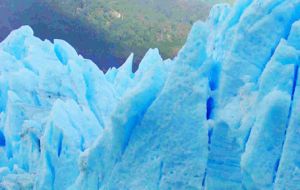MercoPress. South Atlantic News Agency
Glacier experts’ international summit next February in Chile
 There are some 4,000 glaciers in Chile
There are some 4,000 glaciers in Chile Chile will be the focus of international attention in February when Valdivia’s Centre for Scientific Studies (CECS) hosts an international conference of more than 150 experts on glaciers and climate change.
Glaciers provide a first line for monitoring the effects wrought by climate change and there are some 4,000 glaciers in Chile.
Chilean glaciologist Andres Rivera – from CECS - was one of a team of scientists to publish findings this month confirming that the volume of ice in the Andes, the Alps and Alaska is decreasing, and that very few mountain glaciers in these areas will remain at the end of the century.
While not entirely new, the report helped consolidate previous data and was presented along with confirmation of decreasing ice volumes in the Arctic and Greenland contributing to faster-than-predicted sea level rise.
Rivera’s work has helped put Chile at the forefront of climate change study. He is co-author of the chapter on global mountain glaciers for a report presented last week at the Copenhagen climate change summit entitled “Melting Ice and Snow: A Call to Action”.
In related news from the north, a new study revealed a surprise number of rock glaciers in the northern Chilean Andes.
Over 1500 rock glaciers, 628 in the Aconcagua basin alone, have been confirmed by Catholic University geographers. The study was commissioned by the government’s water oversight agency – the DGA - to better understand water supply issues during Chile’s dry season.
Rock glaciers are difficult to identify visually because they are often below the ground surface and consist of more than 60% broken rock and other debris. They also move more slowly than normal ice glaciers, of which there are 3500 in Chile, and do not present the telltale crevasses that form in faster-moving ice.
Rock glaciers have a distinct advantage: because they are buried and less exposed to changing climate, they provide a protected source of reliable base water flow downstream during the dry season.
A monitoring network will be established to further study the rock glaciers and their behaviour in response to changing temperatures.
By Jeremy Valeriote - Santiago Times




Top Comments
Disclaimer & comment rulesCommenting for this story is now closed.
If you have a Facebook account, become a fan and comment on our Facebook Page!